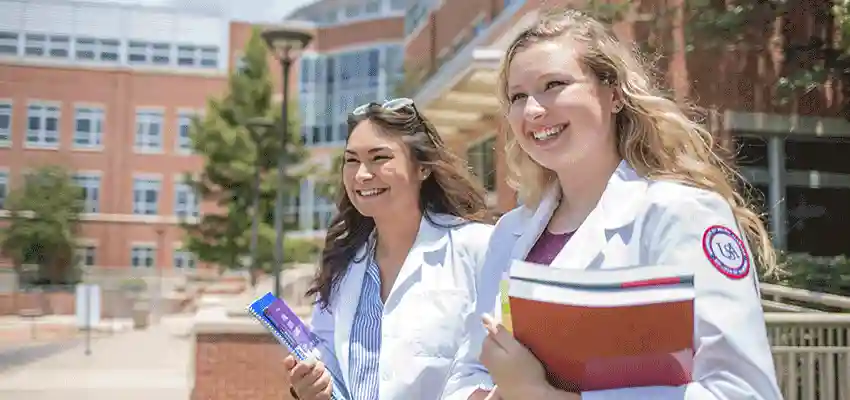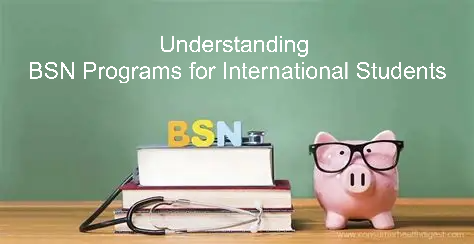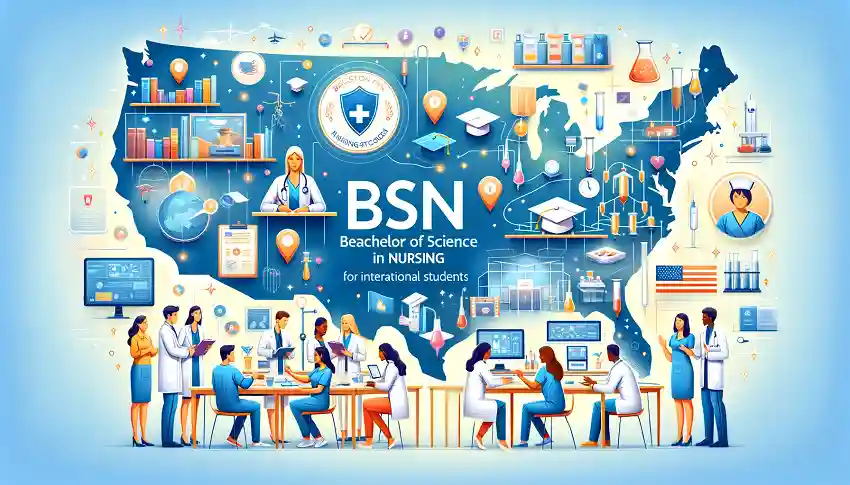The United States offers exceptional opportunities for international students seeking a Bachelor of Science in Nursing (BSN) degree. This comprehensive guide explores the Top BSN Programs in the USA for International Students, providing essential information about admissions, requirements, and career prospects.
Why Choose BSN Programs in the USA?

The USA remains a premier destination for nursing education worldwide. International students benefit from:
- World-class healthcare system with advanced medical technology
- Research opportunities at leading medical institutions
- Diverse clinical experiences across various healthcare settings
- Strong job market with competitive salaries
- Pathway to permanent residency through healthcare employment
- Global recognition of American nursing degrees
American BSN programs prepare graduates for leadership roles in healthcare. The rigorous curriculum combines theoretical knowledge with hands-on clinical practice.
Understanding BSN Programs for International Students

What is a BSN Degree?
A Bachelor of Science in Nursing (BSN) is a four-year undergraduate degree. This program prepares students to become registered nurses (RNs). The curriculum includes:
- Core nursing courses covering patient care fundamentals
- Clinical rotations in hospitals and healthcare facilities
- Science prerequisites including anatomy, physiology, and microbiology
- Liberal arts requirements for well-rounded education
- Leadership and management training for advanced roles
Types of BSN Programs Available
Traditional BSN Programs
- Four-year programs for students with no prior nursing experience
- Include general education and nursing-specific coursework
- Offer extensive clinical training opportunities
Accelerated BSN Programs
- Designed for students with bachelor’s degrees in other fields
- Typically 12-18 months in duration
- Intensive study format with concentrated coursework
RN-to-BSN Programs
- For licensed nurses seeking to advance their education
- Often available online or hybrid format
- Focus on leadership, research, and advanced nursing concepts
Top BSN Programs in the USA for International Students
1. University of Pennsylvania School of Nursing
The University of Pennsylvania’s School of Nursing is widely recognized as one of the top programs in the country. This prestigious institution offers:
Program Highlights:
- Consistently ranked #1 in national nursing school rankings
- Strong research focus with faculty-led innovative projects
- Clinical partnerships with Penn Medicine hospital system
- Diverse student body welcoming international learners
- Excellent NCLEX-RN pass rates among graduates
International Student Support:
- Dedicated international student services
- English language support programs
- Cultural integration activities
- Academic advising specifically for international students
2. Johns Hopkins School of Nursing
The Johns Hopkins School of Nursing is ranked among the top three MSN, DNP, and online nursing programs by U.S. News & World Report. The school provides:
Academic Excellence:
- World-renowned faculty with extensive research experience
- Cutting-edge simulation labs for hands-on learning
- Clinical rotations at Johns Hopkins Hospital
- Research opportunities in various nursing specialties
- Global health initiatives connecting students worldwide
International Student Benefits:
- Comprehensive orientation programs
- Mentorship opportunities with faculty
- Access to research assistantships
- Career counseling services
3. Duke University School of Nursing
Duke University’s nursing program combines theoretical knowledge with hands-on clinical practice. The program offers:
Distinguished Features:
- Innovative curriculum emphasizing evidence-based practice
- State-of-the-art facilities including simulation centers
- Strong alumni network in healthcare leadership
- Interdisciplinary learning with medical and other health students
- Clinical excellence at Duke University Hospital
Support for International Students:
- Specific requirements and support for international applicants
- Academic success coaching
- Professional development workshops
- Networking opportunities with healthcare professionals
4. University of California, San Francisco (UCSF)
UCSF School of Nursing stands among the top nursing programs nationally:
Program Strengths:
- Research-intensive environment with numerous funding opportunities
- Diverse clinical sites throughout the San Francisco Bay Area
- Technology integration in nursing education
- Community health focus addressing healthcare disparities
- Strong job placement rates in competitive markets
5. University of Michigan School of Nursing
This program offers comprehensive nursing education with:
Key Features:
- Flexible scheduling options for diverse student needs
- Extensive clinical network across Michigan
- Research opportunities in health policy and nursing science
- Global health programs providing international perspective
- Strong financial aid packages for qualified students
6. Emory University Nell Hodgson Woodruff School of Nursing
Emory University topped the list for master’s degrees in nursing according to U.S. News & World Report:
Academic Advantages:
- Top-tier faculty with clinical and research expertise
- Modern facilities equipped with latest technology
- Clinical partnerships with Emory Healthcare
- Diverse student body from around the world
- Excellent career outcomes for graduates
7. University of Washington School of Nursing
Located in Seattle, this program provides:
Notable Benefits:
- Pacific Northwest location with diverse healthcare opportunities
- Research focus on health equity and innovation
- Technology integration in healthcare delivery
- International partnerships enhancing global perspective
- Strong community connections for clinical experiences
8. Vanderbilt University School of Nursing
This Nashville-based program offers:
Distinctive Elements:
- Small class sizes ensuring personalized attention
- Clinical excellence at Vanderbilt University Medical Center
- Research opportunities across multiple specialties
- Technology-enhanced learning environments
- Strong support systems for international students
Admission Requirements for International Students
Academic Prerequisites
High School Requirements:
- High school diploma or equivalent credential
- Minimum GPA typically 3.0 or higher
- Science courses including biology, chemistry, and physics
- Mathematics through algebra and statistics
- Strong academic record demonstrating college readiness
Prerequisite Courses:
- Anatomy and Physiology (two-semester sequence)
- General Chemistry with laboratory component
- Microbiology or general biology
- Statistics or college-level mathematics
- Psychology and developmental psychology
- English composition and literature courses
English Language Proficiency
International students must demonstrate English proficiency through:
TOEFL Requirements:
- Minimum score: 80-100 iBT depending on program
- Speaking section: Typically 20+ points required
- Writing section: Strong emphasis on academic writing
- Recent scores: Test scores must be less than two years old at the time of admission review
IELTS Alternative:
- Overall band score: 6.5-7.0 minimum
- Individual sections: No band below 6.0
- Academic version required for university admission
Other Accepted Tests:
- Duolingo English Test: 115+ score typically required
- PTE Academic: 58+ score generally acceptable
- Cambridge English: Advanced or Proficiency levels
Documentation Requirements
Transcripts and Credentials:
- Official transcript evaluation by recognized international credit evaluation service required for foreign coursework
- Original transcripts from all institutions attended
- Course-by-course evaluation through services like WES or ECE
- Grade conversion to US equivalency standards
Additional Documents:
- Valid passport with appropriate visa status
- Financial documentation proving ability to fund education
- Letters of recommendation from academic or professional sources
- Personal statement explaining career goals and motivations
- Resume or CV highlighting relevant experience
Financial Considerations and Costs
Tuition and Fees
Private Universities:
- Annual tuition: $45,000-$65,000 typically
- Living expenses: $15,000-$25,000 per year
- Health insurance: $2,000-$4,000 annually
- Books and supplies: $1,500-$2,500 per year
Public Universities:
- Out-of-state tuition: $25,000-$45,000 annually
- Living costs: $12,000-$20,000 per year
- Additional fees: Technology, lab, and student services
- Total estimated cost: $40,000-$70,000 per year
Scholarship Opportunities
Merit-Based Scholarships:
- Academic excellence awards for high-achieving students
- International student scholarships specifically for foreign applicants
- Diversity scholarships promoting inclusive education
- Leadership awards recognizing community involvement
Need-Based Financial Aid:
- Institutional grants from individual universities
- Private foundation scholarships for nursing students
- Healthcare organization sponsorships for future employees
- Work-study programs providing campus employment
Financial Planning Tips
- Start early with scholarship applications
- Research multiple funding sources beyond university aid
- Consider state-specific programs offering reduced tuition
- Explore employer sponsorship opportunities in home countries
- Budget carefully for living expenses and healthcare costs
Application Process and Timeline
Application Timeline
Junior Year of High School:
- Research programs and create target school list
- Begin test preparation for SAT/ACT if required
- Start English proficiency test preparation
- Gather recommendation letters from teachers and counselors
Senior Year – Fall Semester:
- Submit applications by October-December deadlines
- Complete standardized tests including English proficiency
- Finalize transcripts and credential evaluations
- Apply for scholarships and financial aid
Senior Year – Spring Semester:
- Receive admission decisions typically by March-April
- Submit enrollment deposits by May 1st deadline
- Apply for student visa (F-1) after receiving I-20
- Arrange housing and orientation participation
Application Components
Common Application Materials:
- Completed application form through university portals
- Official transcripts from all educational institutions
- English proficiency scores meeting minimum requirements
- Letters of recommendation (typically 2-3 required)
- Personal statement demonstrating nursing commitment
- Resume or activities list highlighting relevant experience
Program-Specific Requirements:
- Prerequisite course completion verification
- Healthcare experience documentation when required
- Background check and health clearances
- Interview participation for selective programs
- Portfolio submission for some competitive programs
Visa Requirements and Immigration
F-1 Student Visa Process
Initial Steps:
- Receive I-20 form from accepted university
- Pay SEVIS fee ($350) before visa appointment
- Complete DS-160 form online application
- Schedule visa interview at US embassy or consulate
- Gather required documents for visa appointment
Visa Interview Preparation:
- Demonstrate ties to home country
- Show financial capability to fund education
- Explain academic goals clearly and convincingly
- Prepare for common questions about study plans
- Bring all required documentation organized and accessible
Maintaining Legal Status
Academic Requirements:
- Maintain full-time enrollment with minimum 12 credits, 9 of which must be face-to-face courses
- Maintain satisfactory academic progress per university standards
- Complete program within expected timeframe
- Report changes to designated school official (DSO)
Work Authorization:
- On-campus employment allowed up to 20 hours per week
- Optional Practical Training (OPT) after graduation
- Curricular Practical Training (CPT) for required internships
- STEM extension may apply for certain nursing specializations
Clinical Training and Licensing
Clinical Experience Requirements
Hands-On Learning:
- Clinical rotations in various healthcare settings
- Simulation laboratory training with advanced technology
- Community health experiences in diverse populations
- Specialty rotations in areas like pediatrics, mental health, and surgery
- Preceptorship programs with experienced nurses
Clinical Sites Include:
- Major medical centers and teaching hospitals
- Community hospitals serving diverse populations
- Long-term care facilities for geriatric experience
- Public health departments for population health focus
- Specialized clinics for targeted healthcare delivery
NCLEX-RN Licensing Examination
Examination Preparation:
- Comprehensive review courses offered by most programs
- Practice examinations simulating actual test conditions
- Study groups with peer support systems
- Faculty guidance for test-taking strategies
- Online resources for additional preparation
International Student Considerations:
- State-specific requirements for examination eligibility
- Social Security Number requirements vary by state
- Visa status impact on examination scheduling
- License verification processes for international credentials
Career Opportunities and Outcomes
Employment Prospects
Healthcare Settings:
- Hospitals offering acute care services
- Outpatient clinics providing specialized care
- Home healthcare agencies serving community needs
- Public health organizations focusing on prevention
- Research institutions advancing nursing science
Salary Expectations:
- Entry-level RN salary: $60,000-$80,000 annually
- Experienced nurses: $75,000-$100,000+ per year
- Geographic variations with higher pay in certain states
- Specialty areas commanding premium salaries
- Management positions offering advancement opportunities
Advanced Education Pathways
Graduate Degree Options:
- Master of Science in Nursing (MSN) for advanced practice
- Doctor of Nursing Practice (DNP) for clinical leadership
- PhD in Nursing for research and academia
- Specialty certifications in various nursing fields
- Nurse practitioner programs for independent practice
Professional Development:
- Continuing education requirements for license maintenance
- Professional organizations offering networking opportunities
- Conference participation for knowledge advancement
- Research publication opportunities
- Leadership development programs
State-Specific Considerations
Popular States for International Nursing Students
California:
- Highest nursing salaries in the nation
- Diverse patient populations for comprehensive experience
- Multiple top-ranked programs throughout the state
- Technology innovation in healthcare delivery
- Pathway to permanent residency through healthcare employment
New York:
- World-class medical institutions for clinical training
- Cultural diversity reflecting global healthcare needs
- Research opportunities at prestigious universities
- Urban and rural clinical experiences available
- Strong nursing unions protecting worker rights
Texas:
- Growing healthcare sector with expanding opportunities
- Lower cost of living compared to coastal states
- Multiple program options across the state
- Diverse clinical settings from rural to urban
- Hispanic population providing bilingual opportunities
Florida:
- Year-round mild climate for comfortable living
- Aging population creating nursing job demand
- Tourism industry requiring healthcare services
- International gateway facilitating family visits
- No state income tax increasing take-home pay
State Licensing Requirements
Reciprocity Agreements:
- Nurse Licensure Compact (NLC) allows practice across member states
- Individual state requirements for non-compact states
- Continuing education mandates varying by state
- Background check requirements differ by jurisdiction
- Renewal periods ranging from annual to biennial
Preparation Tips for International Applicants
Academic Preparation Strategies
Strengthen Science Background:
- Advanced biology courses including cell biology and genetics
- Chemistry sequence with organic chemistry if possible
- Physics coursework for medical device understanding
- Mathematics skills including statistics and algebra
- Computer literacy for electronic health records
English Language Development:
- Academic writing practice through composition courses
- Medical terminology familiarity before program start
- Oral communication skills for patient interaction
- Professional presentation abilities
- Critical thinking in English language context
Application Enhancement
Healthcare Experience:
- Volunteer work in hospitals or clinics
- Healthcare shadowing with licensed professionals
- Community service in health-related organizations
- Medical mission trips demonstrating global health interest
- Healthcare research participation when possible
Leadership Development:
- Student government participation
- Club leadership roles in healthcare organizations
- Community volunteer coordination
- Tutoring experience in science subjects
- Cultural bridge-building activities
Financial Planning and Budgeting
Cost Management Strategies
Reduce Educational Expenses:
- In-state tuition qualification after residency establishment
- Community college prerequisite completion
- Scholarship applications starting early in process
- Work-study programs for on-campus employment
- Textbook savings through rental and digital options
Living Cost Optimization:
- Shared housing arrangements with other students
- Campus meal plans often more economical than eating out
- Public transportation usage instead of car ownership
- Student discounts for entertainment and services
- Budgeting tools for expense tracking
Scholarship Search Strategies
Research Methods:
- University financial aid offices as primary resources
- Professional nursing organizations offering scholarships
- Healthcare foundations supporting nursing education
- International education organizations in home countries
- Online scholarship databases for comprehensive searching
Application Excellence:
- Early application submission before posted deadlines
- Compelling personal statements highlighting unique backgrounds
- Strong academic records demonstrating commitment
- Community involvement showing leadership potential
- Professional recommendations from healthcare professionals
Challenges and Solutions for International Students
Common Challenges Faced
Academic Adjustments:
- Different educational systems requiring adaptation
- Language barriers in technical medical terminology
- Cultural differences in classroom participation
- Time management with intensive coursework
- Clinical communication with patients and staff
Social Integration:
- Cultural adjustment to American society
- Building friendships with domestic students
- Understanding healthcare culture in the United States
- Professional networking development
- Maintaining connections with home country
Support Systems Available
University Resources:
- International student offices providing comprehensive support
- Academic tutoring services for challenging subjects
- Counseling services for emotional and mental health
- Career counseling for professional development
- Cultural programs facilitating integration
Professional Support:
- Nursing student organizations for peer connection
- Mentorship programs pairing students with professionals
- Study groups for collaborative learning
- Professional conferences for networking opportunities
- Alumni networks providing career guidance
Technology and Innovation in BSN Education
Modern Learning Environments
Simulation Technology:
- High-fidelity patient simulators for realistic training
- Virtual reality applications for complex procedures
- Electronic health records training systems
- Telehealth platforms for remote care education
- Mobile learning applications for flexible study
Research Integration:
- Evidence-based practice emphasis throughout curriculum
- Research methodology training for quality improvement
- Data analysis skills for healthcare outcomes
- Innovation projects addressing healthcare challenges
- Technology assessment for nursing practice applications
Specialization Opportunities
Popular Nursing Specialties
Critical Care Nursing:
- Intensive care units providing life-saving interventions
- Emergency departments handling acute medical situations
- Cardiac care units specializing in heart conditions
- Trauma centers treating serious injuries
- Surgical services supporting operative procedures
Community Health Nursing:
- Public health departments focusing on disease prevention
- School nursing supporting student health needs
- Occupational health in workplace settings
- Home healthcare providing in-home services
- Community clinics serving underserved populations
Pediatric Nursing:
- Children’s hospitals specializing in young patients
- Neonatal intensive care for premature infants
- Pediatric oncology supporting children with cancer
- School health services promoting child wellness
- Family-centered care approaches
Advanced Practice Preparation
Graduate School Preparation:
- Research experience during undergraduate studies
- Professional networking with advanced practice nurses
- Leadership opportunities in student organizations
- Clinical excellence demonstrating competency
- Continuing education mindset development
Success Strategies for International Students
Academic Success Tips
Study Techniques:
- Active learning methods for complex material retention
- Study groups for collaborative problem-solving
- Time management systems for balancing coursework and clinical
- Note-taking strategies for lecture and clinical experiences
- Test preparation methods for nursing examinations
Clinical Excellence:
- Professional communication with patients and colleagues
- Cultural sensitivity in patient care delivery
- Safety protocols adherence in all clinical settings
- Documentation skills for accurate record keeping
- Continuous learning attitude throughout program
Professional Development
Networking Strategies:
- Professional organization membership in nursing associations
- Conference attendance for knowledge and connection building
- Mentorship relationships with experienced nurses
- Alumni connections for career guidance
- Healthcare professional relationship development
Career Preparation:
- Resume building throughout educational experience
- Interview skills development for job applications
- Professional portfolio creation showcasing achievements
- Reference cultivation from faculty and preceptors
- Job market research in desired geographic areas
Post-Graduation Opportunities
Employment Authorization
Optional Practical Training (OPT):
- 12-month authorization for nursing practice
- STEM extension potentially available for specialized areas
- Healthcare employer sponsorship opportunities
- Permanent residency pathways through healthcare employment
- Professional license requirements for practice
Career Advancement Paths
Clinical Leadership:
- Charge nurse positions overseeing unit operations
- Nurse manager roles coordinating department activities
- Clinical educator positions training new nurses
- Quality improvement specialists enhancing patient care
- Research coordinator roles in clinical studies
Advanced Practice Roles:
- Nurse practitioner programs for independent practice
- Clinical nurse specialist positions in specialized areas
- Nurse anesthetist training for surgical procedures
- Nurse midwife education for women’s health
- Administrative roles in healthcare organizations
Regional Considerations for Program Selection
East Coast Programs
Advantages:
- Established medical centers with long histories
- Research opportunities at prestigious institutions
- Cultural diversity in major metropolitan areas
- Transportation infrastructure facilitating travel
- Historical significance in nursing education development
Notable Programs:
- Johns Hopkins in Baltimore, Maryland
- University of Pennsylvania in Philadelphia
- Duke University in Durham, North Carolina
- Emory University in Atlanta, Georgia
- Columbia University in New York City
West Coast Options
Benefits:
- Innovation focus in healthcare technology
- Diverse populations for comprehensive clinical experience
- Research funding opportunities in health sciences
- Quality of life factors including climate
- International connectivity facilitating family visits
Leading Programs:
- University of California, San Francisco
- University of Washington in Seattle
- Oregon Health & Science University
- University of California, Los Angeles
- Stanford University (graduate programs)
Midwest and Central Regions
Characteristics:
- Lower cost of living compared to coastal areas
- Strong healthcare systems serving rural and urban populations
- Research universities with excellent nursing programs
- Cultural authenticity representing mainstream America
- Job opportunities in growing healthcare markets
Top Programs:
- University of Michigan in Ann Arbor
- Case Western Reserve University in Cleveland
- University of Illinois at Chicago
- Washington University in St. Louis
- University of Iowa College of Nursing
Future Trends in Nursing Education
Emerging Technologies
Educational Innovation:
- Artificial intelligence applications in nursing education
- Virtual reality training for complex procedures
- Telehealth integration in curriculum development
- Mobile health applications for patient monitoring
- Electronic health records advanced training
Practice Evolution:
- Population health focus in nursing practice
- Interprofessional collaboration emphasis
- Quality metrics integration in patient care
- Evidence-based practice standard implementation
- Cultural competency requirements for diverse populations
Global Health Perspectives
International Opportunities:
- Study abroad programs in healthcare settings
- Global health initiatives addressing worldwide challenges
- International clinical experiences
- Research collaborations with international institutions
- Cultural exchange programs enhancing understanding
Conclusion
The Top BSN Programs in the USA for International Students offer amazing career opportunities. These programs provide world-class nursing education with excellent clinical training. Success requires early planning, strong English skills, and proper financial preparation. American nursing degrees are globally respected. International students bring valuable perspectives to healthcare. Start your nursing journey today by researching programs and preparing your applications carefully.






